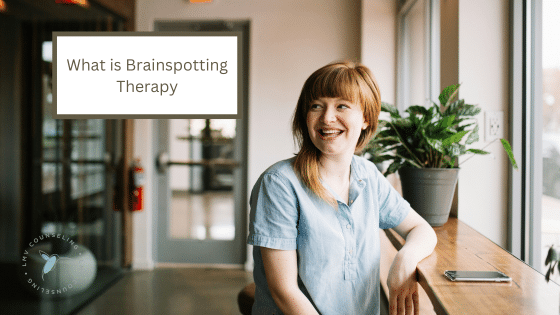Brainspotting therapy, an innovative approach designed to help you heal and regain control of your mental health. Developed in 2003 by Dr. David Grand, it is a powerful method that taps into the brain’s natural ability to heal itself. Here’s what you need to know about this groundbreaking therapy.
What is Brainspotting?
Brainspotting is a type of therapy that uses specific spots in a person’s visual field to help them process trauma. This therapy accesses trauma stored in the part of the brain that is responsible for emotions, motion, and learning. By focusing on these “brainspots,” therapists can help clients release deeply rooted trauma without needing to relive the traumatic experience.
How Does Brainspotting Work?
Brainspotting operates on the theory that trauma can become “stuck” in the body, leading to both physical and mental health issues. Think of it like scar tissue for your brain. Dr. Grand discovered that specific eye positions correlate with these traumatic memories, allowing therapists to guide clients to access and process these painful emotions effectively. Unlike traditional talk therapy, Brainspotting is a “bottom-up” approach that focuses on releasing physical stress in the body, thereby alleviating emotional distress.
What to Expect in a Session
A typical Brainspotting session is more fluid and less structured than other therapies but generally follows the following framework:
- Relaxation: The session begins with breathing exercises, sometimes accompanied by bilateral sound (music that alternates between the ears) to enhance mindfulness.
- Identifying Discomfort: Clients identify a point of physical discomfort in their body, ranking it on a scale of one to ten.
- Finding Your Brainspot: With the therapist’s assistance, clients focus on a spot in their visual field that correlates with their physical discomfort. This spot is identified either by the therapist (Outside Window approach) or the client (Inside Window approach).
- Processing Emotions: Clients focus on this brainspot while allowing associated feelings to surface. The therapist helps clients stay with these feelings, facilitating the processing and integration of the trauma.
- Decompressing: The session ends with a review and another check in the client’s distress level, which is typically lower than at the start of the session.
 Benefits of Brainspotting Therapy
Benefits of Brainspotting Therapy
Brainspotting can be incredibly beneficial for various mental health issues, including:
- Trauma and PTSD: Helps process and release trauma, leading to significant relief from PTSD symptoms.
- Anxiety and Depression: Reduces anxiety and depressive symptoms by addressing the root causes stored in the brain.
- Chronic Pain: Can help to alleviate chronic pain by releasing emotional stress held in the body.
-
-
-
-
-
-
- Substance Use Disorders: Assists in overcoming addiction by addressing underlying traumatic experiences.
- Attachment Issues: Helps resolve attachment problems stemming from childhood trauma.
-
-
-
-
-
-
Why Choose LMV Counseling?
At LMV Counseling, we prioritize your mental health and well-being. Our certified Brainspotting therapist has undergone specialized training to ensure you receive the highest quality care. We create a safe, supportive environment where you can explore and process your emotions at your own pace.
Getting Started with Brainspotting
If you’re ready to take the next step in your healing journey, consider Brainspotting therapy at LMV Counseling. Please indicate your desire to enroll in this type of therapy on our appointment request form. Our team is here to support you through each session, helping you achieve lasting relief and a better quality of life.
Take Control of Your Healing Today
Brainspotting therapy at LMV Counseling offers a unique and effective way to address trauma and other mental health challenges. By focusing on thebrain-body connection, this therapy helps you release trapped emotions and move towards a state of balance and well-being. Contact us today to schedule an appointment and discover how Brainspotting can help you on your path to healing.

